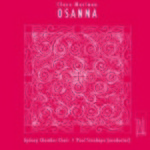Audio Sample
|
|
Performance by Sydney Chamber Choir, Paul Stanhope from the CD Osanna |
CD
Osanna / Clare Maclean ; Sydney Chamber Choir, Paul Stanhope (conductor).
Library shelf no. CD 2239 [Not for loan]
Score
Osanna mass : unaccompanied choir / Clare Maclean.
Library shelf no. 782.323/MAC 1 [Not for loan]
Work Overview
The title of the Osanna Mass is taken from part of the text of the Sanctus, Osanna in excelsis. The word osanna comes from the Hebrew hoshiana, which means "Save us now!" but has also taken on a connotation of praise-"hosanna in the highest!"-and the two threads of prayer and praise run through the text of the Mass.
The Mass movements are based on the set of plainchants for the Ordinary of the Mass, Kyriale IX (Cum iubilo), making it like a Renaissance paraphrase mass. Each movement also incorporates the chants of other movements, as well as Jewish liturgical melodies.
The music of the Osanna Mass acts like the illustrations of medieval manuscripts. The text of the Mass is 'illuminated' by the associations of the borrowed melodies and their texts, along with associations of the divine in accompanying material derived from church bells ("Gloria" and "Sanctus") and birdsong ("Benedictus"). Some visual aspects of medieval illustration are translated into music: at times the texture consists of decorative patterns, and the use of darker and lighter modal colours express the themes of prayer and praise in the text. These themes are also expressed symbolically through the use of flatter or sharper modes, and through the recurrence of significant pitches associated with these modes (for example, F#/Gb occurs in texts related to the passion of Christ). The recurring pitches further contain a more general symbolism, of the presence of the unchanging Transcendent, hidden in the world. This use of musical 'emblems' is like the way symbolic meanings were attached to visual emblems such as plants and animals in medieval illuminated manuscripts.
Work Details
Year: 2008
Instrumentation: SATB choir (Part divisions vary for each movement. The largest division is SSS AAAA TTTT BBB)
Duration: 30 min.
Difficulty: Advanced — Some rhythmically and/or harmonically difficult passages
Contents note: Kyrie -- Gloria -- Credo -- Sanctus -- Benedictus -- Agnus Dei.
Written for: Sydney Chamber Choir
Awarded 'Work of the Year: Choral/Vocal' at the 2012 APRA/AMC Art Music Awards.
Awards & Prizes
| Year | Award | Placing | Awarded for/to |
|---|---|---|---|
| 2012 | Art Music Awards: Work of the Year: Vocal/Choral | Winner | Clare Maclean |
Analysis
Resonate article: 2012 Art Music Awards - comments by judging panels by Australian Music Centre
Subjects
- In the form/style of: Masses
User reviews
Be the first to share your thoughts, opinions and insights about this work.
To post a comment please login.

